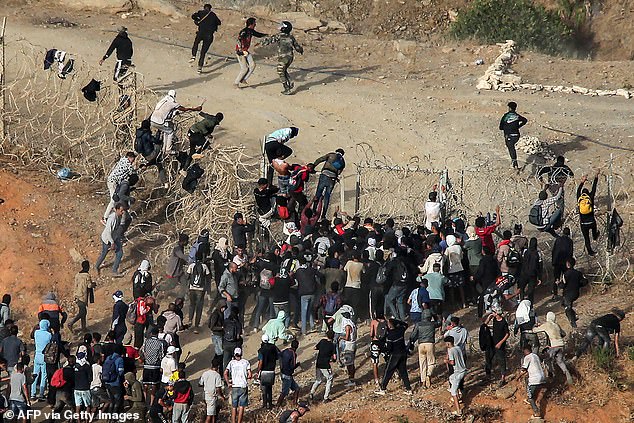Migrants storm EU border: Hundreds of people swarm over barbed wire fences after throwing rocks at Moroccan guards following calls on social media to force their way into the Spanish enclave

Hundreds of migrants scaled barbed wire fences in a desperate attempt to enter a Spanish enclave in Morocco, but were pushed back by riot police.
The swarm of people, including Moroccans and minors, was seen on Sunday trying to enter Spain’s African enclave of Ceuta, near Fnideq in northern Morocco.
Local media reported that there had been another attempt to cross the border earlier on Sunday, but this attempt was also intercepted by Moroccan police.
Tensions were high in the area on Sunday after hundreds of people gathered at the border following calls on social media for a collective attempt to break through.
The young migrants were mostly Moroccans, but some came from other parts of Africa, Spanish news agency EFE reported at the time.

Migrants storm a barbed wire fence as they attempt to cross the land border into the Spanish enclave of Ceuta in Africa, near Fnideq in northern Morocco on September 15

The migrants were stopped by Moroccan riot police and sent back home

Hundreds of people gathered at the border after calls on social media for a collective attempted break-in

The Moroccan Ministry of the Interior reported that in August, authorities blocked more than 11,300 attempts to enter Ceuta and 3,300 attempts to enter Melilla.
“The security services have deported 2,400 people who were likely to try to migrate illegally ‘within three days’,” Hespress reported on Sunday, citing an anonymous official source.
‘They were arrested while on their way to Fnideq in preparation for their emigration to Ceuta.’
Since Friday, Moroccan security forces have been deployed in Fnideq on a large scale.
“This is the heaviest security deployment ever in Fnideq, with authorities acting pre-emptively by setting up several checkpoints along the roads to northern Morocco,” said Mohammed Ben Aissa, a local human rights activist.
A police source told AFP that 60 people were arrested between Monday and Wednesday for “fabricating and spreading false information on social media” to encourage a collective illegal border crossing.
On September 15, also known as ‘The Promised Day’, social media saw massive calls for mass migration from Morocco to Ceuta.
The messages, which went viral and were spread mainly through platforms such as TikTok and Instagram, encouraged Moroccan youth to gather in the border town of Fnideq and then attempt to cross the border into Ceuta en masse via the border with El Tarajal.
According to Morocco World NewsThe posts encouraged followers to swim or walk across the border into Ceuta on Sunday, using emojis including the Moroccan and Spanish flags.
These ‘publicly announced invitations’ raised the question of how such secret operations could be announced so openly. As a result, thousands of Moroccan youths came to Fnideq to prepare for what was locally called the ‘Great Escape’.
In response to the ‘Great Escape’ planned by Moroccan youth, Spain is forced to mobilise additional military reinforcements to the coast of Ceuta.
And on the other side of the border, members of the Spanish Guardia Civil and the national police have become increasingly active, deploying helicopters to guard the border fence.
The Spanish enclaves of Ceuta and Melilla are the only land borders between Africa and the European Union. Both enclaves have seen large numbers of migrants attempting to cross into the EU.

Members of the Moroccan auxiliary forces arrest a man after being deployed to prevent illegal crossings of the land border with the Spanish enclave of Ceuta in Africa

Moroccan police on August 16 pushed back hundreds of people who were heading towards the Spanish enclave of Ceuta

On September 15, or ‘The Promised Day’, social media saw massive calls for mass migration from Morocco to Ceuta

The movement was locally called ‘The Great Escape’

Since Friday, Moroccan security forces have been deployed en masse in Fnideq
According to local reports, hundreds of Moroccan youths managed to reach Fnideq, the town closest to Ceuta, before police arrested them at night and sent them back to their homes.
According to the Moroccan Ministry of the Interior, authorities blocked more than 11,300 attempts to enter Ceuta and 3,300 attempts to enter Melilla in August.
But the most popular route from Morocco for migrants wanting to reach Spain is by sea.
This year, up to and including August 15, more than 22,300 migrants have been registered in the Canary Islands in the Atlantic Ocean. That is an increase of 126 percent compared to 2023.
Some tried to breach a border fence that has long been a flashpoint for sporadic migration tensions, but none managed to enter Spain, the Spanish Interior Ministry confirmed on Monday.
According to the ministry, Spanish and Moroccan security efforts in recent days “have made it possible to bring the situation under control.”
Morocco and Spain have been working to improve cooperation on tackling illegal migration since 2022, after a diplomatic rift over Rabat’s plans for autonomy for Western Sahara.
According to the Moroccan Ministry of the Interior, authorities stopped more than 45,000 people trying to enter European territory illegally in the first eight months of this year.
Last month, hundreds of migrants used the dense fog as cover to swim to Ceuta, Spanish police said.
In June 2022, human rights groups in Spain and Morocco called on both countries to investigate after 23 migrants were killed as around 2,000 people tried to cross the border.
With stricter controls on Morocco’s northern borders, more and more migrants are choosing to take the riskier and longer Atlantic route to the Canary Islands.




